
Bible Verse and Prayer for Today;
The LORD shall fight for you, and ye shall hold your peace.
Exodus 14:14
Prayer
Lord . Thank You for Your Protection against our enemies , Thank Your for the Fight was won by Jesus against Evil . we can only stand aside and be silent in our Battles . for You have the Fights our Fights in your hands , Thanking You in Jesus name , Amen and Amen
Prayer Tips
Prayers in the Old Testament
- Jeremiah’s Prayer to the Lord
Jeremiah 14:7 O LORD, though our iniquities testify against us, do thou it
for thy name’s sake: for our backslidings are many; we have sinned
against thee.
8 O the hope of Israel, the savior thereof in time of trouble, why shouldest
thou be as a stranger in the land, and as a wayfaring man that turneth
aside to tarry for a night?
9 Why shouldest thou be as a man astonied, as a mighty man that cannot
save? yet thou, O LORD, art in the midst of us, and we are called by thy
name; leave us not.
10 Thus saith the LORD unto this people, Thus have they loved to wander,
they have not refrained their feet, therefore the LORD doth not accept
them; he will now remember their iniquity, and visit their sins.
11 Then said the LORD unto me, Pray not for this people for their good. - Our sins remove us from God, before going to God in prayer ask forgiveness for your sins.
- God will not listen to the prayers of those who are sinning purposely.
Bybel Vers en Gebed vir Vandag
Die HERE sal vir julle veg, en julle moet stil wees.
Eksodus 14:14
Gebed
Here. Dankie vir U Beskerming teen ons vyande, Dankie dat Jesus die stryd teen die bose gewen het. Ons kan net opsy staan en stil wees in ons gevegte. Want U het die gevegte, ons gevegte, in u hande. Ons dank U in Jesus se Naam, Amen en Amen.
Gebede in die Ou Testament
Jeremia se Gebed aan die Here
Jer 14:7 Hoewel ons ongeregtighede teen ons getuig, o HERE, doen dit om u Naam ontwil; want ons afkerighede is baie, ons het teen U gesondig.
8 o Verwagting van Israel, sy Verlosser in tyd van benoudheid! Waarom sou U wees soos ‘n vreemdeling in die land en soos ‘n reisiger wat uitdraai om te vernag?
9 Waarom sou U wees soos ‘n man wat verslae is, soos ‘n held wat nie kan verlos nie? U is tog in ons midde, o HERE, en u Naam is oor ons uitgeroep. Verlaat ons nie!
10 So sê die HERE van hierdie volk: Só het hulle daarvan gehou om te swerwe, hulle het hul voete nie teruggehou nie; daarom het die HERE geen behae in hulle nie. Nou sal Hy aan hulle ongeregtigheid dink en hulle sondes besoek.
11 Verder het die HERE vir my gesê: Bid nie vir hierdie volk ten goede nie.
- Ons sondes sal deur God verwyder word, voordat ons na God gaan in gebed moet ons eers om vergifnis te vra vir ons sondes.
- God sal nie na die gebede luister van diegene wat opsetlik sondig nie.

Bible Teaching of the Day
The early days of the church were a time of phenomenal growth and apostolic miracles. In Acts 5:15-16 we read, “People brought the sick into the streets and laid them on beds and mats so that at least Peter’s shadow might fall on some of them as he passed by. Crowds gathered also from the towns around Jerusalem, bringing their sick and those tormented by evil spirits, and all of them were healed.”
One thing we must note: nowhere does the passage say that anyone was actually healed by being in Peter’s shadow. Neither does the passage tell us that the apostles ever commanded people to line the streets or condoned such actions. The only facts that we can draw from the wording of verse 15 are that people obviously had a high regard for Peter’s miracle-working and that they placed faith in the efficacy of even his shadow. Verse 16 does say people were healed at that time, but there is no indication that Peter’s shadow was the cause. In fact, the verse specifies that “all were healed”—even those who were not under Peter’s shadow.
People wanted to believe there was something special about Peter, and they began seeking proximity to him in hopes of having some power pass over them. It wasn’t the first (or last) time that people sought a special blessing through a physical object. The paralyzed man in John 5 believed that water in a certain pool could heal his lameness. Some Ephesians in Acts 19 believed that healing power was concentrated in articles of Paul’s clothing (cf. Matthew 9:21). Some people today put their trust in handkerchiefs that have been “prayed over,” in relics of the saints, or in holy water.
In Acts 3 God’s power was demonstrated through Peter and John when a lame man was healed. The news spread quickly, and a great crowd gathered in Solomon’s Colonnade, full of amazement. Peter spoke to the crowd, correcting their assumption that he and John had special power in themselves: “Men of Israel, why does this surprise you? Why do you stare at us as if by our own power or godliness we had made this man walk?” (verse 12). The apostle then goes on to point the crowd to Jesus: “It is Jesus’ name and the faith that comes through him that has given this complete healing to him, as you can all see” (verse 16).
In Acts 5, the sick were not being healed by shadows or auras or magical garments; they were being healed as a direct answer to the apostles’ prayer in Acts 4:30: “Stretch out your hand to heal and perform miraculous signs and wonders through the name of your holy servant Jesus.” The miracles performed by the apostles were demonstrations of the Lord’s power and mercy, affirming Christ Jesus as Savior and testifying that their message was true.
Trusting shadows is not wise. What if it had been a cloudy day? Would those in need have been out of luck? What happened at high noon, when Peter had no shadow to speak of? We are glad that God’s power to heal is not dependent on anyone’s ability to be in the right place, at the right time, under the right conditions. Shadows come and go, but God’s power is constant.
Bybel Lering vir die Dag
Die vroeë dae van die kerk was ‘n tyd van fenomenale groei en apostoliese wonderwerke. In Handelinge 5:15-16 lees ons: “Mense het die siekes na die strate gebring en hulle op beddegoed en matte gelê sodat ten minste Petrus se skaduwee op sommige van hulle kon val as hy verbygaan. Ook het skares van die dorpe rondom Jerusalem bymekaargekom en hulle siekes en dié wat deur bose geeste gekwel is, gebring, en hulle is almal genees.”
Een ding wat ons moet oplet: nêrens sê die gedeelte dat enigiemand werklik genees is deur in Petrus se skaduwee te wees nie. Die gedeelte sê ook nie vir ons dat die apostels ooit mense beveel het om die strate te ry of sulke optrede goedgekeur het nie. Die enigste feite wat ons uit die bewoording van vers 15 kan aflei, is dat mense klaarblyklik ‘n hoë agting vir Petrus se wonderwerke gehad het en dat hulle geloof in die doeltreffendheid van selfs sy skaduwee geplaas het. Vers 16 sê wel dat mense destyds genees is, maar daar is geen aanduiding dat Petrus se skaduwee die oorsaak was nie. Trouens, die vers spesifiseer dat “almal genees is” – selfs diegene wat nie onder Petrus se skaduwee was nie.
Mense wou glo dat daar iets spesiaals omtrent Petrus was, en hulle het begin om nabyheid aan hom te soek in die hoop dat een of ander krag oor hulle sou vloei. Dit was nie die eerste (of laaste) keer dat mense ‘n spesiale seën deur ‘n fisiese voorwerp gesoek het nie. Die verlamde man in Johannes 5 het geglo dat water in ‘n sekere poel sy kreupelheid kon genees. Sommige Efesiërs in Handelinge 19 het geglo dat genesende krag gekonsentreer was in Paulus se klere (vgl. Matteus 9:21). Sommige mense plaas vandag hul vertroue in sakdoeke waaroor “gebid” is, in relieke van die heiliges, of in heilige water.
In Handelinge 3 is God se krag deur Petrus en Johannes gedemonstreer toe ‘n kreupel man genees is. Die nuus het vinnig versprei, en ‘n groot menigte het in Salomo se Kolonnade vergader, vol verbasing. Petrus het met die skare gepraat en hul aanname reggestel dat hy en Johannes spesiale krag in hulself gehad het: “Manne van Israel, waarom verbaas dit julle? Waarom staar julle ons aan asof ons deur ons eie krag of godsvrug hierdie man laat loop het?” (vers 12). Die apostel wys dan die skare na Jesus: “Dit is Jesus se Naam en die geloof wat deur Hom kom, wat Hom volkome genesing gegee het, soos julle almal kan sien” (vers 16).
In Handelinge 5 is die siekes nie deur skaduwees of auras of magiese klere genees nie; hulle is genees as ‘n direkte antwoord op die apostels se gebed in Handelinge 4:30: “Steek u hand uit om te genees en doen wonders en tekens deur die Naam van u heilige Dienaar Jesus.” Die wonderwerke wat deur die apostels verrig is, was demonstrasies van die Here se krag en barmhartigheid, wat Christus Jesus as Verlosser bevestig en getuig dat hulle boodskap waar was.
Om skaduwees te vertrou, is nie wys nie. Wat as dit ‘n bewolkte dag was? Sou diegene in nood ongelukkig gewees het? Wat het op die middag gebeur, toe Petrus geen skaduwee gehad het om van te praat nie? Ons is bly dat God se krag om te genees nie afhanklik is van enigiemand se vermoë om op die regte plek, op die regte tyd, onder die regte omstandighede te wees nie. Skaduwees kom en gaan, maar God se krag is konstant.

Today’s Devotional
“What is the condition of your soul?”
Worldwide, we are seeing an increase in disasters with earthquakes in China and Ethiopia, tornadoes in Madagascar and Mozambique, typhoons in Taiwan and more. Here in South Africa, we have also seen fires, floods and crime take away loved ones and material possessions.
And even if we do not experience disasters or tragedies of this magnitude, many of us are fighting our own battles, dealing with our own problems, facing our own trials and grappling with our own crises.
Our lifespan is only a few years, our problems may last only a few days and our fears may blow over in a moment. But while we are in pain, while our hearts are filled with sorrow and our lives are taken over by worry, we must ask: “What is the condition of our souls?”
Horatio Spafford faced many challenges. He lost a fortune in the great Chicago fire of 1871. During this time, his beloved four-year-old son died of scarlet fever. He sent his wife and four daughters to England. While crossing the Atlantic, the ship sank and all four of his daughters drowned. Horatio decided to join his wife in England. On his way to England, near the place where his daughters drowned, Horatio wrote:
When peace like a river, attendeth my way,
When sorrows like sea billows roll—
Whatever my lot, thou hast taught me to know
It is well, it is well with my soul.
However, many ask; “How do I measure the condition of my soul?” In short, your perspective (view) and relationship with Jesus Christ determine the condition of your soul. If you have agreed to make Jesus Christ the crucified the center of your existence and are obedient to Him and His Word, it is well with your soul. If you can say, as Paul did, “I determined not to know anything among you except Jesus Christ, and him crucified,” then it is with your soul. Also, if you can say, “But far be it from me to boast, except in the cross of our Lord Jesus Christ, through whom the world has been crucified to me, and I to the world,” then it is with your soul. (See 1 Corinthians 2:2 and Galatians 6:14)
“Therefore, since we also are surrounded by so great a cloud of witnesses, let us also lay aside every weight and the sin which so easily entangles us, and let us run with endurance the race that is set before us, looking to Jesus, the author and perfecter of our faith, who for the joy that was set before him endured the cross, despising the shame, and is seated at the right hand of the throne of God.” (Hebrews 12:1-2)
Vandag se Bemoediging
“Wat is die toestand van Jou siel?”
Wêreldwyd sien ons ‘n toename van rampe met aardbewings in China en Ethiopië, tornado’s in Madagaskar en Mosambiek, tifone in Taiwan en meer. Hier in Suid-Afrika het ons ook gesien hoe brande, vloede en misdaad geliefdes van ons ontneem en aardse besittings wegruk.
En selfs al ervaar ons nie rampe of tragedies van hierdie omvang nie, veg baie van ons ons eie gevegte, hanteer ons ons eie probleme, staar ons ons eie beproewinge in die gesig en worstel met ons eie krisisse.
Ons lewensduur is maar ‘n paar jaar, ons probleme kan net ‘n paar dae duur en ons vrese kan binne ‘n rukkie oorwaai. Maar terwyl ons in pyn is, terwyl ons harte gevul is met hartseer en ons lewens deur kommer oorgeneem word, moet ons vra: “Wat is die toestand van ons siele?”
Horatio Spafford het talle uitdagings in die gesig gestaar. Hy het ‘n fortuin verloor in die groot Chicago-brand van 1871. Gedurende hierdie tyd het sy geliefde vierjarige seun aan skarlakenkoors gesterf. Hy het sy vrou en vier dogters na Engeland gestuur. Terwyl die skip die Atlantiese Oseaan oorgesteek het, het die skip gesink en al vier sy dogters het verdrink. Horatio het besluit om by sy vrou in Engeland aan te sluit. Op pad na Engeland, naby die plek waar sy dogters verdrink het, het Horatio geskryf.
When peace like a river, attendeth my way,
When sorrows like sea billows roll—
Whatever my lot, thou hast taught me to know
It is well, it is well with my soul.
Talle vra egter; “Hoe meet ek die toestand van my siel?” In kort, jou perspektief (siening) en verhouding met Jesus Christus bepaal die toestand van jou siel. As jy ingestem het om Jesus Christus die gekruisigde die middelpunt van jou bestaan te maak en gehoorsaam is aan Hom en Sy Woord, is dit wel met jou siel. As jy, soos Paulus kan sê: “Ek het my voorgeneem om met julle oor niks anders te praat nie as oor Jesus as die Christus, en wel oor Hom as die gekruisigde”, dan is dit wel met jou siel. Ook, as jy kan sê “Maar wat my betref, mag ek nooit roem nie, behalwe in die kruis van onse Here Jesus Christus, deur wie die wêreld vir my gekruisig is en ek vir die wêreld” is dit wel met jou siel. (Sien 1 Korintiërs 2:2 en Galasiërs 6:14)
“Daarom dan, terwyl ons so ‘n groot wolk van getuies rondom ons het, laat ons ook elke las aflê en die sonde wat ons so maklik omring, en met volharding die wedloop loop wat voor ons lê, die oog gevestig op Jesus, die Leidsman en Voleinder van die geloof, wat vir die vreugde wat Hom voorgehou is, die kruis verdra het, die skande verag het en aan die regterkant van die troon van God gaan sit het. (Hebreërs 12:1-2)

TruLight Ministries Daily Entertainment

TruLight TV – Join the Laughter: Bob Stromberg’s Unique Storytelling Night!
Enjoy Bob Stromberg’s Comedy Special During Today’s Program. Bob Stromberg delights audiences of all ages with his unique personal style of speaking, storytelling, and humor. His presentation is clean, casual, characterized by humility, and a healthy blend of knee-slapping comedy and encouragement. In a word, Bob’s gift is his ability to interact with an audience, develop a warm rapport, gather people together, and facilitate surprising laughter with an arsenal of gifts including physical comedy.
INTRODUCTION TO THE GOSPEL ARTISTS
MEET : THE ERWINS
The Erwin’s dedication to musical excellence has garnered them numerous accolades and recognition within the industry. The group’s Grammy nomination stands as a testament to their exceptional artistry and distinctive sound, while their Dove Award win solidifies their place among Southern Gospel music’s finest.
Beyond their musical achievements, The Erwins remain grounded in their faith. Their unwavering commitment to integrity, both on and off the stage, has earned them the respect and admiration of their peers and fans alike.
Today on TruLight Radio XM

TruLight Radio XM 24/7
Program
GMT / UTC +2
00:15 Words to Live By Testimonies
01.15 Science Scripture and Salvation
02.15 Ground Works
04.00 Gospel Concert of the Day
05.00 The Daren Streblow Comedy Show
5:55 It is Today devotional
6:00 Gaither Homecoming Morning Show
7:15 Discover the Word
8.15 Destined for Victory
8:55 Science Scripture and Salvation
9:00 Holy Spirit Hour – Normally Sermons
10:15 Hope of the Heart
11:15 Unshackled
11.45 Words to Live By
12:15 Truth for Life
13:15 Living on the Edge with Chip Ingram
14:15 Focus on the Family
15:00 Kids Hour
16:00 In Touch with Dr. Charles Stanley
16:30 Groundwork
17:15 Live in the Light
18:15 Renewing your Mind
19:00 Gaither Homecoming Show
20:15 Growing Hope
21:15 Adventures in Odyssey Radio Drama
21:45 Bible Reading
22:15 Night-sounds
23.00 Good Old Country Gospel / Rhema Gospel Express
VISIT THE WEBSITE
https://TruLightRadioXM.org.za

Bible Prophecy in the News
BRICS are becoming a Problem for the Current World order . Current World order is Pushing for Gog and Magog
A New World Order? The BRICS Summit Could Change Everything This July 2025

This July, leaders from across the globe will converge on Rio de Janeiro (Old and News Members and Planned to Join Members) for what may be the most consequential BRICS summit to date. The stakes are high and the implications global.
How NASA May Have Just Pinpointed the Exact Day Jesus Died

NASA scientists have calculated the date a lunar eclipse occurred in A.D. 33 that may pinpoint the day of Jesus’ crucifixion.
In Genesis 1, we read that God said, “Let there be lights in the expanse of the heavens to separate the day from the night. And let them be for signs and for seasons and for days and years.”
So it’s not surprising there would be a least one sign in the heavens to mark the death of Jesus as a sacrifice for the sins of the world.
The New York Post reported that NASA’s “astronomical models suggest that a lunar eclipse turned the moon red over Jerusalem on Friday, April 3, 33 AD — a date many scholars tie to Jesus’ death.”
In the Gospel of Matthew, chapter 27, we read, “Now from the sixth hour [noon] there was darkness over all the land until the ninth hour.”
But extra-biblical texts indicate that in addition to this daytime darkness, a blood moon occurred the night of Jesus’ death.
“At his crucifixion the sun was darkened; the stars appeared and in all the world people lighted lamps from the sixth hour till evening; the moon appeared like blood,” read a passage from the Report of Pilate — part of the New Testament apocrypha, the Post said.
The Bible answer site Got Questions reported that A.D. 33 is the likely year of Jesus’ crucifixion, based on a prophecy in the book of Daniel.
In Daniel 9, the prophet writes of being visited by the angel Gabriel while he and his fellow Jews were being held in Babylonian captivity. Gabriel told him that the time from the decree to rebuild Jerusalem is issued until the “anointed one” (i.e., Jesus) is cut off, will be 69 weeks of years, or 483 years.
King Artaxerxes of Persia issued the decree to “restore and rebuild Jerusalem” c. 444 B.C.
“Converting the 360-day year used by the ancient Jews, 483 years becomes 476 years on our solar calendar. Adjusting for the switch from B.C. to A.D., 476 years after 444 B.C. places us at A.D. 33, which would coincide with Jesus’ triumphal entry into Jerusalem (Matthew 21:1-9). The prophecy in Daniel 9 specifies that, after the completion of the 483 years, ‘the Anointed One will be cut off’ (verse 26). This was fulfilled when Jesus was crucified,” according to Got Questions.
The late Dallas Theological Seminary professor Harold Hoehner calculated April 3, A.D. 33 as the date of Jesus’ crucifixion in his seminal book “Chronological Aspects of the Life of Christ” employing the Daniel prophecy.
Additionally, author Andreas Köstenberger wrote a piece titled “April 3, AD 33: Why We Believe We Can Know the Exact Date Jesus Died” for the Center for Biblical Studies at Midwestern Baptist Theological Seminary.
“In the Pharisaic-rabbinic calendar commonly used in Jesus’s day, Passover always falls on the fifteenth day of Nisan (Exodus 12:6), which begins Thursday after sundown and ends Friday at sundown. In the year a.d. 33, the most likely year of Jesus’s crucifixion, Nisan 15 fell on April 3, yielding April 3, a.d. 33, as the most likely date for the crucifixion,” he explained.
The number three is significant in the Bible. Got Questions explained that it stands for divine perfection.
We know that Jesus rose on the third day, and that he is the second Person of the Trinity.
So it would not be shocking that God, knowing the Gregorian solar calendar would become the world’s calendar, would choose April 3, A.D. 33 as the date he redeemed sinners. And NASA may have helped verify the date.
For the First Time in 2,000 Years: Lamb Brought to Temple Mount for Second Passover
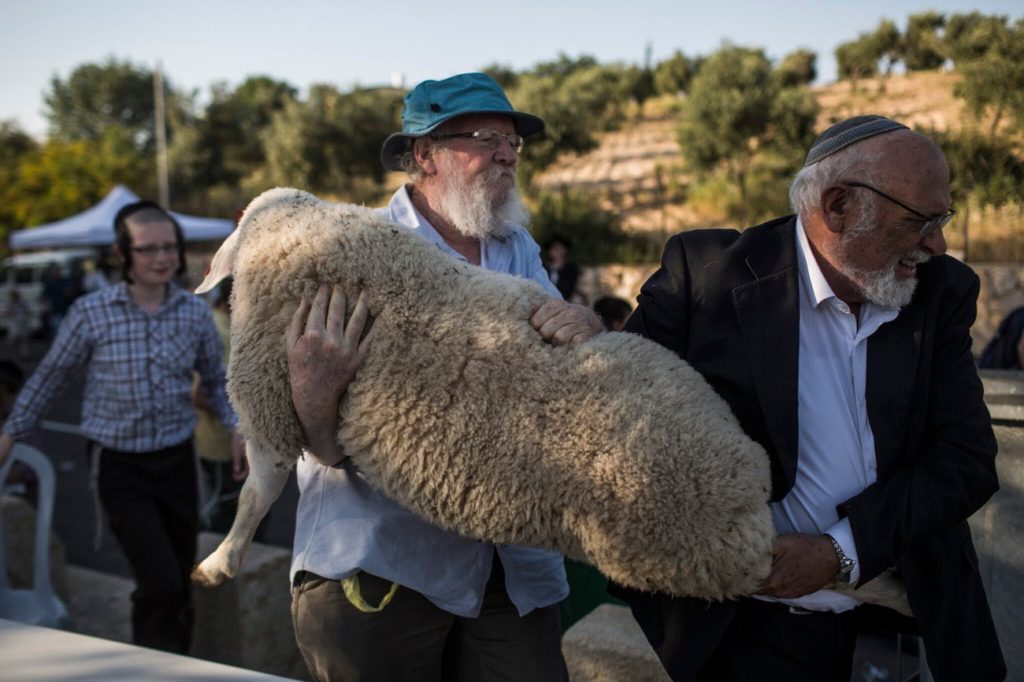
Several Jews were arrested on Sunday at the gates of the Temple Mount after they managed to bring a lamb onto the Mount to sacrifice it for the second Passover.
Signs of the Times
World Continues To Ignore Unprecedented Levels Of Christian Persecution

Every year, Open Doors reports its World Watch List which ranks the top 50 nations in which Christians are the most persecuted for their faith.
In 2024, around the world, 4,476 Christians — more than 12 a day on average — were “killed for faith related reasons.” Another 4,744 Christians were arrested or illegally detained, and 7,679 churches and other Christian institutions were attacked, often destroyed.
Overall, the global persecution of Christians has reached unprecedented levels. “More than 380m Christians suffer high levels of persecution and discrimination for their faith,” according to the World Watch List 2025 (WWL) published earlier this year by the international human rights organization, Open Doors.
Every year, the WWL ranks the top 50 nations in which Christians are the most persecuted for their faith. The data is compiled by thousands of grassroots workers and external experts. The latest edition of the WWL covers October 1, 2023 to September 30, 2024.
According to the WWL, around the world, one in seven Christians (14%) is persecuted. In Africa, that number grows to one in five (20%). In Asia, it is a shocking two in five — meaning 40% of all Christians there are persecuted.
The list categorizes three levels of persecution: “extreme”, “very high” and “high.”
The top 13 of the 50 nations on the list are characterized by the worst form of persecution: “extreme.” They are: 1) North Korea, 2) Somalia, 3) Yemen, 4) Libya, 5) Sudan, 6) Eritrea, 7) Nigeria, 8) Pakistan, 9) Iran, 10) Afghanistan, 11) India, 12) Saudi Arabia, and 13) Myanmar.
The form of persecution experienced there ranges from assault, rape, imprisonment, or even murder on being identified as a Christian or attending (usually underground) churches.
Coming in as #1 is North Korea:
“If your Christian faith is discovered in North Korea, you could be killed on the spot. If you aren’t killed, you will be deported to a labour camp and treated as a political criminal. You will be punished with years of hard labour that few survive. And it’s not only you who will be punished: North Korean authorities are likely to round up your extended family and punish them too, even if your family members aren’t Christians. There is no church life in North Korea. It’s impossible to gather for worship or prayer, and even secret worship and prayer is at great risk. Official spies could inform on you, if they have any indication that you are a Christian, and so could your neighbours or teachers.”
Not surprisingly, most of the “extreme persecution” meted out to Christians in nine of these 13 worst nations continues to come either from Islamic oppression, or occurs in nations with large Muslim populations. Significantly, this means that approximately 70% of the absolute worst (“extreme”) persecution around the globe takes place under the aegis, or in the name, of Islam.
This trend affects the entire list: the rest of the “very high” or “high” levels of persecution that Christians experience in 37 of the 50 ranked nations (or 74%), also comes either from Islamic oppression or occurs in nations with majority or large Muslim populations. Many of these nations are governed by some form of shari’a (Islamic law). Those enforcing the persecution can either be the government or society or, more frequently, both, although societies — particularly family members outraged by relatives who have converted — tend to be more zealous in the application of shari’a.
This means that although the persecution in North Korea is worse, there is at least a light at the end of the tunnel: the ill-treatment of Christians is entirely connected to the regime of Kim Jong-un. “Recognising any deity beyond the Kim family is considered a threat to the country’s leadership,” notes the report. Once the Kim family is gone, which is inevitable, North Korea may well become like South Korea, where Christianity is flourishing.
Conversely, the persecution of Christians by Muslims is perennial, existential, and far transcends this or that ruler or regime. Persecution of the “other” in Islam is part of its history, doctrines and socio-political makeup — hence its tenacity and ubiquity. Brief summaries of the dangers of being Christian in the nine Muslim nations where “extreme” levels of persecution occur include:
Somalia, #2, where only a few hundred Christians are believed to exist,
“… following Jesus is a matter of life and death. Al-Shabab, a violent Islamist militant group… enforces a strict form of Sharia (Islamic law) and is committed to eradicating Christianity from Somalia. They have often killed Somali Christians on the spot. The dangers have increased over the years, as the militants have increasingly focused on finding and eliminating Christian leaders.
Yemen, #3:
“The country is now divided into territory ruled by three different [Muslim] powers, as well as some areas held by al-Qaeda and the so-called Islamic State. None of the powers involved are sympathetic to Christians, and the official constitution upholds Sharia (Islamic law) and no freedom of religion. The 1% of Yemenis from minority religions are severely marginalised. Relief aid is mostly distributed through local Muslim groups and mosques, which are alleged to be discriminating against anyone not considered a devout Muslim. If someone is reported to be a Christian and or involved in Christian activities, they could face severe monitoring, arbitrary detention, torture, ill-treatment and even murder.”
Libya, #4:
“…following Jesus is a huge risk for anyone. Libyan Christians with a Muslim background face violent pressure from their families and communities to renounce their faith. Foreign Christians, especially those from sub-Saharan Africa, are targeted by Islamist militant and criminal groups. These groups kidnap and sometimes brutally kill Christians. Even if they avoid such a fate, sub-Saharan Christians face harassment and threats from radical Muslims. Christians who openly express their faith or try to share it with others risk arrest and violent opposition.”
Sudan, #5:
“Sudan was on a path towards religious freedom, but a coup and devastating war dashed these hopes. Christians are once again in danger… The conflict has given Islamist extremists more opportunity to target them. More than 100 churches have been damaged so far, and Christians have been abducted and killed. Sudanese Christians who have come to faith from a Muslim background face severe backlash from their families and communities. These believers tend to keep their faith secret, even from their own children. Christians are also experiencing exceptional hardship in the hunger crisis because local communities discriminate against them and won’t give them support.”
Nigeria, #7:
“Jihadist violence continues to escalate in Nigeria, and Christians are particularly at risk from targeted attacks by Islamist militants, including Fulani fighters, Boko Haram and ISWAP (Islamic State West Africa Province)…. The attacks are shockingly brutal. Many believers are killed, particularly men, while women are often kidnapped and targeted for sexual violence. More believers are killed for their faith in Nigeria than anywhere else in the world. [A total of 3,100 Nigerian Christians “paid the ultimate price for their faith” in 2024.]
These militants also destroy homes, churches and livelihoods. More than 16.2 million Christians in sub-Saharan Africa, including high numbers from Nigeria, have been driven from their homes by violence and conflict. Millions now live in displacement camps. Christians living in northern Nigerian states under Sharia (Islamic law) can also face discrimination and oppression as second-class citizens. Converts from Islam often experience rejection from their own families and pressure to renounce their new faith. They often have to flee their homes for fear of being killed.”
Christian carnage is so endemic to Nigeria that, only recently, on April 13 — Palm Sunday — 54 Christians were slaughtered following church celebrations in one village alone. And as bad as it is in Nigeria, “Sadly, more Christians were killed outside Nigeria, many in sub-Saharan Africa countries like DRC, Burkina Faso, Cameroon, Niger.” The report continues
“Multiple countries in Sub-Saharan Africa have seen a rise in violence against Christians. Currently, 8 of the top 10 deadliest places for Christians are in Sub-Saharan Africa–and all of them (except Nigeria) have more faith-based killings than they did during the 2024 World Watch List reporting period.”
Pakistan, #8:
“Pakistan’s notorious blasphemy laws are often used to target minority groups, but Christians are disproportionately affected. Indeed, roughly a quarter of all blasphemy accusations target Christians, who make up just 1.8 per cent of the population. Blasphemy laws carry a death sentence. While this is seldom carried out, people accused of blasphemy are vulnerable to attack or murder by mobs. In June 2024, an elderly man was killed by mob violence after being accused of desecrating the Quran…. Historical churches … are heavily monitored and have been targeted for bomb attacks.
The number of Christian girls (and those from other minority religions) abducted, abused and forcefully converted to Islam (frequently backed by lower courts) is growing…. All Christians suffer institutionalized discrimination. Occupations that are deemed low, dirty and degrading – such as cleaning sewers or working in brick kilns – are reserved for Christians by the authorities. Many are referred to as ‘chura’, a derogatory term meaning ‘filthy’. Christians are also vulnerable to being trapped in bonded labor.”
Iran, #9:
“Unrecognized converts from Islam to Christianity face severe religious freedom violations, primarily from the government and, to a lesser extent, from society and their families. The government views these converts as a threat, believing they are influenced by Western countries to undermine Islam and the regime. Both leaders and ordinary members of Christian groups are often arrested, prosecuted and given long prison sentences for ‘crimes against national security’.
Recognized historical communities such as Armenian and Assyrian Christians are state-protected but treated as second-class citizens. They face many discriminatory legal provisions and are not allowed to worship in Persian or interact with Christian converts. Those who support converts can also face imprisonment.”
Afghanistan, #10:
“Most Afghan Christians are converts from Islam, which makes it basically impossible to practise their faith openly. In Afghanistan, leaving Islam … and conversion is punishable by death under Islamic law. This has been increasingly enforced since the Taliban took control of the country in 2021. If converts are discovered, the family, clan or tribe may try to preserve its ‘honour’ and deal with the convert through pressure, violence or even murder. If a convert’s faith is discovered by the government, many Afghan believers have no other option but to try to flee. Women and ethnic minorities experience additional oppression. Christians among these groups live under unthinkable pressure.”
Saudi Arabia, #12:
“It’s very risky to become a Christian in Saudi Arabia. Not only is it illegal to leave the Islamic faith, new believers will face intense opposition from their families and communities as well…. Because of this, most Saudi Christians tend to follow their faith quietly and secretly. This extends as far as not even telling their own spouse or children about their faith, for fear that extended family members or school staff could discover that they have left Islam. There are no legal church buildings or meetings…. The majority of the Christians living in Saudi Arabia are temporary workers from other countries. They are forbidden from sharing their faith with local Saudis, and gathering for worship is restricted. Breaking these rules can get them detained and deported.”
Notably, the nine “extreme” persecuting Muslim nations listed above are different in many respects–racially, socially, economically and governmentally: some are rich (Saudi Arabia), while others are unimaginably poor (Somalia); some are advanced (Iran), while others are far from it (Yemen); they are represented by a variety of governments (republics, monarchies, theocracies); and various different races are represented — Arabs, sub-Saharan Africans, Pakistanis, Persians and Afghans. The only commonality they all share, the common denominator, is Islam.
The variety grows when looking at the full list of 50 nations, which also includes Sinic and Turkic nations–such as Maldives (#16), Uzbekistan (#25), Turkey (#45), and Brunei (#48)– all of which share little in common other than Islam. Kyrgyzstan, which has not made the top 50 list since 2013, made a dramatic return at #47:
“There was a sharp increase in violence against the church, many registered churches and Christian institutions were forced to close, and pressure on Christians increased in almost all spheres of life.”
Beyond the Muslim world, however, hostility for Christianity has, in fact, become pandemic. As the report notes:
“Several countries on the World Watch List saw an increase in anti-Christian violence. While the contexts were different, either tightly controlled autocratic states, or countries that are unstable due to weak government or civil war, the result was the same: targeting of Christian communities, destruction of lives, homes and churches, and immense pressure on believers.”
A rise in Hindu nationalism has made India (#11) a hotbed of persecution:
“In India, Hindu extremists view all Christians as outsiders and aim to cleanse the nation of Islam and Christianity, often using extensive violence. This hostility is often driven by Hindutva, an ongoing Hindu nationalist belief among some extremists that Indians ought to be Hindu – and no other faith will be tolerated. This mindset has led to violent attacks across the country and impunity for the people who hold these beliefs, especially where the authorities are also Hindu hardliners. In such places, Christians who attend house churches risk attack by extremist mobs who target services. Additionally, 12 states have passed anti-conversion laws, which threaten religious freedom for individual believers.”
Even in Buddhist Myanmar (#13), the last nation to make the top 13 offenders, where Christians experience “extreme” levels of persecution:
“Since the military coup in February 2021, Christians have encountered greater violence and tighter restrictions. Believers have been killed and churches have been indiscriminately attacked. This includes those in predominantly Christian states… More Christians than ever have been driven out of their homes and have found refuge in churches or displacement camps. Some are even forced to flee to the jungle where they are often deprived of access to food and health care.
Government forces have continued to disproportionately attack Christian villages and churches. They have also killed Christian aid workers and pastors, often in aerial attacks. Beyond the conflict, converts to Christianity find themselves persecuted by their Buddhist, Muslim or tribal families and communities because they have left their former faith. Communities who aim to stay ‘Buddhist only’ make life impossible for Christian families.”
Even in nations that would appear to be friendly or at least neutral to Christianity, such as Cuba, Nicaragua and Mexico, Christians are being abused for their faith, by a variety of actors and for a variety of reasons.
In communist Cuba, #26:
“Church leaders and Christian activists who criticise the regime can face interrogation, arrest and imprisonment. They also suffer smear campaigns, travel restrictions, and harassment (which can include physical violence and damage to church buildings).”
Although not communist, in Nicaragua, #30:
“Hostility toward Christians continues to intensify: those who speak out against President Ortega and his government are viewed as destabilising agents. …Christian leaders have been harassed and arrested, Christian properties seized, Christian schools, TV stations and charities closed, and churches monitored and intimidated.”
In Mexico (#31), drug cartels target Christians, especially if they speak out against their activities or try to lead the youth away from them; in southern Mexico, especially “in some Indigenous communities, those who decide to leave ancestral and traditional beliefs to follow Jesus face ostracism, fines, incarceration and forced displacement.”
Perhaps the most disturbing trend is that the persecution of Christians continues to grow every year, and has nearly doubled since 1993, when the WWL was first issued. Then, only 40 nations scored high enough to warrant sufficient tracking. Today, nearly double that number qualify, though the list only ranks the top 50.
How long before this ongoing trend metastasizes into even those Western nations once hailed for their religious liberties?
LARGEST IN HISTORY: US Signs $142 Billion Defense Deal with Saudis .
” THE EAGLE WINGS SIGNS DEAL WITH THE KING OF THE SOUTH ”

The White House announced that US President Donald Trump has signed the largest defense sales agreement in history, a $142 billion deal with Saudi Arabia.
The deal will include state-of-the-art equipment supplied by over a dozen US companies.
Sales will fall into five basic categories: airforce advancement and space capabilities, air and missile defense, maritime and coastal security, border security and land forces modernization, and information and communication systems upgrades.
In addition, the US will agree to train and strengthen Saudi armed forces and expand Saudi military training institutions.
The defense sales agreement is part of a larger $600 million investment commitment between the two countries.
Is Trump Really Breaking with Israel?
Gog and Magog Update
All News Highlights the Past 24 Hours
In the early evening the IDF carried out a number strikes in the vicinity of the European Hospital in Khan Yunis. The IDF later confirmed that it used a series of bunker busters to take out a Hamas command bunker under the European Hospital. The target was Muhammad Sinwar, the current leader of Hamas and the brother of the Yahya Sinwar, the mastermind of October 7th.
Syria Offers Israel Deal in Exchange for US Backing
Israel Accused of Bombing Gaza to Make Tourist Paradise
NETANYAHU: IDF to Launch ‘Never Before Seen’ Gaza Offensive
IRGC Commander-in-chief Threatens to ‘Open the Gates of Hell’ on Israel
Places in the Bible
Mt. Zion
Also known as Mount Sion, the Upper City, the Southwestern Hill
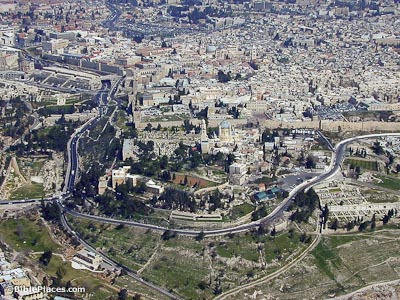
Aerial from the South
The modern Mount Zion is a misnomer applied by Byzantine pilgrims who thought that the larger, flatter Western Hill must be the original City of David. Archaeological evidence has shown that this hill was only incorporated within the city’s fortifications in the 8th century BC, but the name has stuck. The Hinnom Valley borders this hill on its western and southern sides.
Dormition Abbey
Crowning the summit of the modern Mount Zion is Dormition Abbey. Commemorating the rest that Mary entered into, this complex was constructed by Kaiser Wilhelm II beginning in 1900. The church was built in response to a request to have a German Catholic church in the city following the Kaiser’s support for the construction of the Lutheran Church of the Redeemer in 1898.

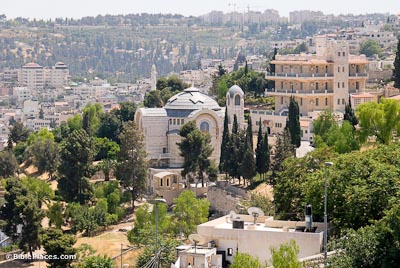
St. Peter in Gallicantu
On the southeastern slope of the hill is one of the traditional locations for the house of Caiaphas. Gallicantu means “cock crowing” and it remembers the three denials of Peter. Built atop the ruins of a Byzantine church and monastery, Catholic pilgrims believe that the prison in which Christ was held is located inside the church. Others believe that a more likely location for Caiaphas’s house is in the Armenian property outside Zion Gate.
The Upper Room
The room visited by tourists today is a Crusader structure as evidenced by the architecture. On the first floor below this room is the traditional tomb of David. The location of this “tomb” outside of the City of David precludes its authenticity but some suggest that evidence in the “tomb” indicates an early Jewish-Christian presence (or synagogue). If so, this could support this general area as the location of the biblical “Upper Room.”
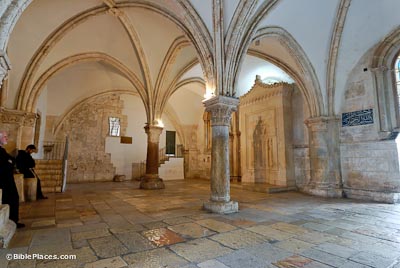
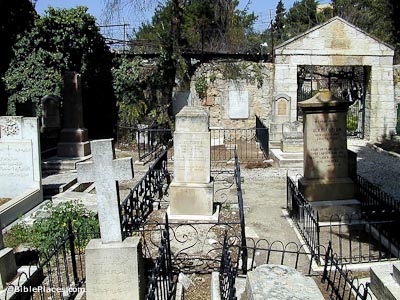
Protestant Cemetery
In the backyard of the Bishop Gobat School (today housing Jerusalem University College) is the Protestant Cemetery where many notables of the 19th century are buried. The writer of the hymn “It Is Well With My Soul,” Horatio G. Spafford, is buried in the far center of this photograph. Also buried in this cemetery are important archaeologists Sir Flinders Petrie and James Leslie Starkey.
View from Bell Tower
This rare shot from the top of the Dormition Abbey bell tower gives a view of Mount Zion and the Western Hill from the south. Visible are the south wall of the Old City and the Armenian Quarter with the Mount of Olives on the right horizon. Dormition Abbey is home today to German Catholic monks.
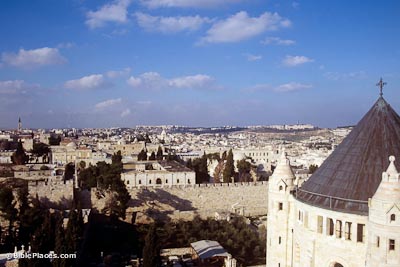
TruLight Ministry News

TruLight Ministries orders from God since 2012 . Teach Them , Comfort Them and Warn Them!
////////////
TruLight Ministries opdrag vanaf God sedert 2012. Leer hulle, Troos hulle en Waarsku hulle!
Pastoor Dirk se Audio Lering 3/8 Laaste 8 Jaar op Aarde – Studie 3 Smile and Wave
TruLight School of Theology have started with Its daily Bible Study – Pastor Counselling Certificate – we are Starting with 36 Studies with 10 Studies per Topic from 1st of April 2025 – Over the Next 2 Years we will Include One Daily Study per Topic on this Platform. The Daily Manna Bible Study will be Available in English and Afrikaans!
We will Start with a 68 week Study on “Know Your Bible” Daily Bible Summaries of every Chapter in the Bible! From the Old Testament to the New Testament , from Genesis to Revelation 66 Books of the Bible.
Started 1st April 2025
This is our Study Principals:
SOAP
Scripture: Read a short passage out loud.
Observation: What do you notice about the verses?.
Application: How can you apply this to your life?.
Prayer: Pray about what you’ve learned.
REAP
Read: Read the passage carefully.
Engage: Ask questions about the passage.
Apply: Think about how the passage applies to your life.
Pray: Pray about what you’ve learned.
Introduction to the Bible – Bible Summary
Summary of the Book of
Habakkuk
Author: Habakkuk 1:1 identifies the Book of Habakkuk as an oracle from the prophet
Habakkuk.
Date of Writing: The Book of Habakkuk was likely written between 610 and 605 BC.
Purpose of Writing: The prophet Habakkuk decries the sins of Judah but grapples with
the fact that God’s chosen people will suffer at the hands of enemies even more wicked
than they. God answers Habakkuk’s questions, resulting in continuing faith in God’s
wisdom, sovereignty, and salvation.
Key Verses:
Habakkuk 1:2, “How long, LORD, must I call for help, but you do not listen? Or cry out to
you, ‘Violence!’ but you do not save?”
Habakkuk 1:5, “Look at the nations and watch—and be utterly amazed. For I am going
to do something in your days that you would not believe, even if you were told.”
Habakkuk 1:12, “Are you not from everlasting, O LORD my God, my Holy One? We shall
not die” (ESV).
Habakkuk 2:2–4, “Then the LORD answered me and said: ‘Write the vision And make it
plain on tablets, That he may run who reads it. For the vision is yet for an appointed
time; But at the end it will speak, and it will not lie. Though it tarries, wait for it; Because
it will surely come, It will not tarry. Behold the proud, His soul is not upright in him; But
the just shall live by his faith’” (NKJV).
Habakkuk 2:20, “The LORD is in his holy temple; let all the earth be silent before him.”
Habakkuk 3:2, “LORD, I have heard of your fame; I stand in awe of your deeds, LORD.
Repeat them in our day, in our time make them known; in wrath remember mercy.”
Habakkuk 3:19, “The Sovereign LORD is my strength; he makes my feet like the feet of a
deer, he enables me to tread on the heights.”
Brief Summary: The Book of Habakkuk begins with Habakkuk crying out to God for an
answer to why God’s chosen people are allowed to suffer in their captivity (Habakkuk
1:1–4). The Lord gives His answer to Habakkuk, essentially stating, “You wouldn’t believe
it if I told you” (Habakkuk 1:5–11). Habakkuk then follows up by saying, “OK, you are
God, but, still, tell me more about why this is happening” (Habakkuk 1:17—2:1). God
then answers him again and gives him more information, then tells the earth to be silent
before Him (Habakkuk 2:2–20). Then Habakkuk writes a prayer expressing his strong
faith in God even through these trials (Habakkuk 3:1–19).
Foreshadowings: The apostle Paul quotes Habakkuk 2:4 on two occasions (Romans
1:17; Galatians 3:11) to reiterate the doctrine of justification by faith. The faith that is the
gift of God and available through Christ is at once a faith that saves (Ephesians 2:8–9)
and a faith that sustains throughout life. We attain eternal life by faith, and we live the
Christian life by the same faith. In contrast to the “proud,” whose soul is not right within
him (Habakkuk 2:4, NASB) and whose desires are not upright (NIV), is the one made
righteous by faith in Christ. That person’s sin was exchanged for Christ’s perfection (2
Corinthians 5:21). Now his soul is right within him, and his desires are upright, as Christ
has enabled him to live by faith. The redeemed person is not proud but is humble
(see Matthew 5:5). He follows the Lord Jesus, who is “gentle and humble in heart”
(Matthew 11:29).
Practical Application: The application to the reader of Habakkuk is that it is permissible
to question what God is doing, although with respect and reverence. Sometimes it is not
evident to us what is going on, especially if we are thrown into suffering for a time or if
it seems our enemies are prospering while we are just barely getting by. The Book of
Habakkuk affirms that God is sovereign and omnipotent, and He has all things under
control. We just need to be still and know He is at work. He is who He says He is and
does keep His promises. He will punish the wicked. Even when we cannot see evidence
of His dominion, God is still on the throne of the universe. We need to stay focused on
this: “The Sovereign LORD is my strength; he makes my feet like the feet of a deer, he
enables me to tread on the heights” (Habakkuk 3:19). To “tread on the heights” is a
picture of our ability, in the power of God, to rise above the troubles and hindrances of
this world and experience victory over our enemies. Sometimes the way before us is full
of suffering and sorrow, but, if we trust the Lord, we will come safely to where He wants
us to be.
Inleiding tot die Bybel – Bybel Samevatting
Opsomming van die boek
Habakuk
Skrywer: Habakuk 1:1 identifiseer die Boek Habakuk as ‘n orakel van die profeet
Habakuk.
Datum van Skrywe: Die Boek van Habakuk is waarskynlik tussen 610 en 605 vC geskryf.
Doel van skrywe: Die profeet Habakuk verwerp die sondes van Juda, maar worstel met
die feit dat God se uitverkore volk sal ly onder die hande van vyande wat selfs slegter as
hulle is. God beantwoord Habakuk se vrae, wat lei tot voortgesette geloof in God se
wysheid, soewereiniteit en verlossing.
Sleutelverse:
Habakuk 1:2 , “Hoe lank, HERE , moet ek om hulp roep, maar U luister nie? Of roep vir jou
uit: ‘Geweld!’ maar jy red nie?”
Habakuk 1:5 , “Kyk na die nasies en waak—en wees heeltemal verstom. Want Ek gaan
iets in jou dae doen wat jy nie sou glo nie, al sou dit vir jou gesê word.”
Habakuk 1:12 “Is U nie van ewigheid af nie, HERE my God, my Heilige? Ons sal nie sterf
nie” (ESV).
Habakuk 2:2-4 “Toe antwoord die HERE my en sê: Skryf die gesig op en maak dit duidelik
op tafels, dat hy kan hardloop wat dit lees. Want die gesig is nog vir ‘n vasgestelde tyd;
Maar aan die einde sal dit praat, en dit sal nie lieg nie. Al vertraag dit, wag daarvoor;
Want dit sal sekerlik kom, Dit sal nie uitstaan nie. Kyk, die hoogmoediges, sy siel is nie
reg in hom nie; Maar die regverdige sal uit sy geloof lewe’” (NV).
Habakuk 2:20 , “Die HERE is in sy heilige tempel; laat die hele aarde voor Hom swyg.”
Habakuk 3:2 , “ HERE , ek het gehoor van u roem; Ek staan in verwondering oor u dade,
HERE . Herhaal hulle in ons dag, maak hulle bekend op ons tyd; in toorn dink aan
barmhartigheid.”
Habakuk 3:19 , “Die Soewereine HEER is my sterkte; Hy maak my voete soos die voete
van ‘n hert, Hy stel my in staat om op hoogtes te trap.”
Kort opsomming: Die Boek Habakuk begin met Habakuk wat tot God roep vir ‘n
antwoord oor hoekom God se uitverkore volk toegelaat word om in hulle ballingskap te
ly ( Habakuk 1:1–4 ). Die Here gee Sy antwoord aan Habakuk, en sê in wese: “Jy sal dit
nie glo as Ek jou vertel nie” ( Habakuk 1:5–11 ). Habakuk volg dan op deur te sê: “OK, U
is God, maar vertel my tog meer oor hoekom dit gebeur” ( Habakuk 1:17—2:1 ). God
antwoord hom dan weer en gee hom meer inligting, en sê dan vir die aarde om stil te
wees voor Hom ( Habakuk 2:2–20 ). Dan skryf Habakuk ‘n gebed wat sy sterk geloof in
God uitdruk selfs deur hierdie beproewinge ( Habakuk 3:1–19 ).
Voorspellings: Die apostel Paulus haal Habakuk 2:4 by twee geleenthede aan ( Romeine
1:17 ; Galasiërs 3:11 ) om die leerstelling van regverdigmaking deur geloof te herhaal.
Die geloof wat die gawe van God is en deur Christus beskikbaar is, is tegelyk ‘n geloof
wat red ( Efesiërs 2:8–9 ) en ‘n geloof wat lewenslank volhou. Ons verkry die ewige lewe
deur geloof, en ons leef die Christelike lewe deur dieselfde geloof. In teenstelling met
die “hoogmoediges”, wie se siel nie reg in hom is nie ( Habakuk 2:4, NASB ) en wie se
begeertes nie reg is nie (NBV), is die een wat regverdig gemaak is deur geloof in
Christus. Daardie persoon se sonde is verruil vir Christus se volmaaktheid ( 2 Korintiërs
5:21 ). Nou is sy siel reg in hom, en sy begeertes is opreg, soos Christus hom in staat
gestel het om deur geloof te lewe. Die verloste persoon is nie trots nie, maar is nederig
(sien Matteus 5:5 ). Hy volg die Here Jesus, wat “sagmoedig en nederig van hart is” (
Matteus 11:29 ).
Praktiese Toepassing: Die toepassing op die leser van Habakuk is dat dit geoorloof is
om te bevraagteken wat God doen, alhoewel met respek en eerbied. Soms is dit nie vir
ons duidelik wat aangaan nie, veral as ons vir ‘n tyd lank in lyding gegooi word of as dit
lyk of ons vyande voorspoedig is terwyl ons skaars oor die weg kom. Die Boek Habakuk
bevestig dat God soewerein en almagtig is, en dat Hy alle dinge onder beheer het. Ons
moet net stil wees en weet Hy is aan die werk. Hy is wie Hy sê Hy is en kom wel Sy
beloftes na. Hy sal die goddelose straf. Selfs wanneer ons nie bewyse van Sy heerskappy
kan sien nie, is God steeds op die troon van die heelal. Ons moet hierop gefokus bly:
“Die Soewereine HEER is my krag; Hy maak my voete soos die voete van ‘n hert, Hy stel
my in staat om op hoogtes te trap” ( Habakuk 3:19 ). Om “op die hoogtes te trap” is ‘n
beeld van ons vermoë om in die krag van God uit te styg bo die probleme en
hindernisse van hierdie wêreld en die oorwinning oor ons vyande te ervaar. Soms is die
pad voor ons vol lyding en hartseer, maar, as ons die Here vertrou, sal ons veilig kom
waar Hy wil hê ons moet wees.
We are Currently reading and Listening to the Bible, a Chapter a Day !
The total number of chapters in the Bible is 1,189. There are 929 chapters within 39 books of the Old Testament and 260 chapters within the 27 books of the New Testament.
Genesis 30 / 31 English – Follow the Reading in Your Bible.
Genesis 30 / 31 Afrikaans – Volg die Leser in u Bybel.
Share this Feeding of Manna with your Friends and Family. just click on the Social Media icon and share !